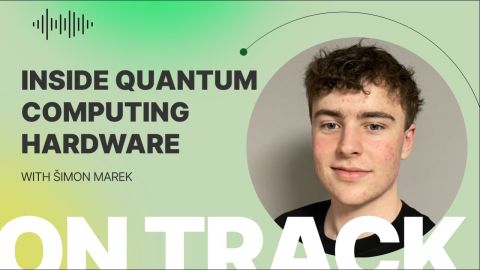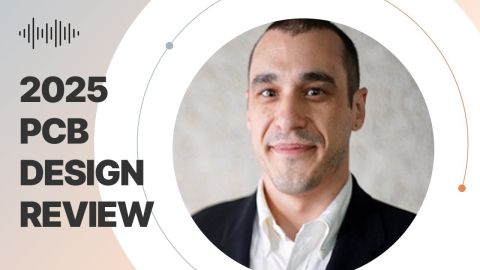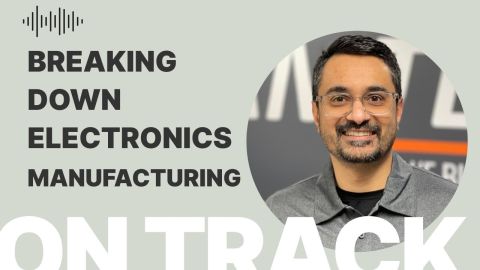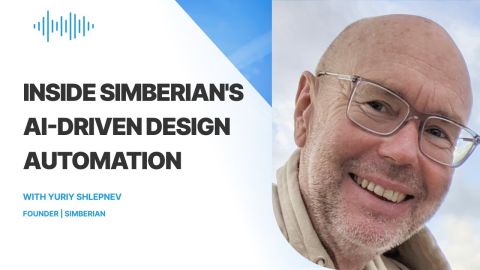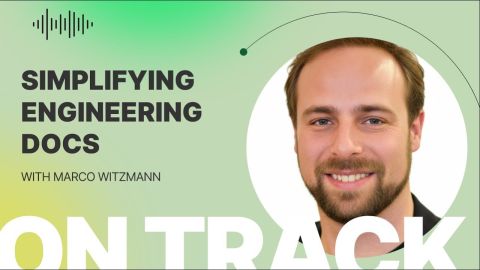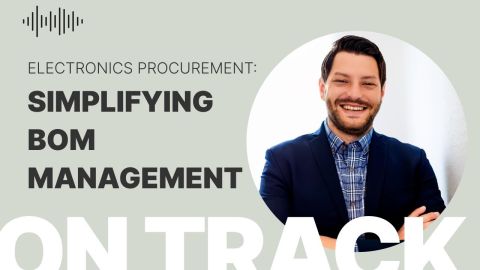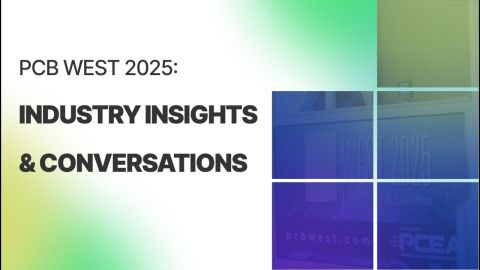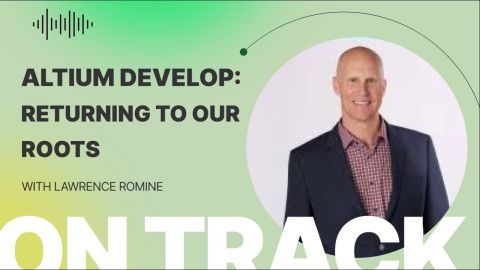Promoting the Electronics Industry to the Next Generation

IPC continues to develop resources to bring awareness about the electronics industry to the young generation.
In this episode, we are very fortunate to have Charlene Gunther, the Senior Director of the IPC Education Foundation. We will talk about IPC’s efforts to involve students in engaging activities that will introduce the electronic industry to them as early as high school.
Join us and watch through the end. We added some great resources below so be sure to check them out.
Listen to the Podcast:
Download this episode and listen on the go
Watch this Episode:
Episode Highlights:
- Charlene Gunther introduction and a brief overview of her role as the Senior Director of the IPC Education Foundation
- Charlene talks about the IPC three pillars: awareness, engagement, and connections
- The IPC launched the website www.careersinelectronics.com which aims to attract students and job seekers within the electronics industry
- The IPC student chapter plays a big role to attract and involving students in skill development training and networking
- IPC is hosting annual STEM outreach and partners with Title I schools and private institutions to expose high school students to hands-on activities, connecting them with industry, allowing them to solder, to design, to learn about assembly
- Other departments of the IPC that work towards improving accessible education are the Education Department led by Vice President David Hernandez and Chris Mitchell the VP of Advocacy and Government Relations
- The universities’ response to IPC programs has been very positive and they have become more proactive in integrating electronics and manufacturing-related courses into their curriculum
- Be in the loop with the latest IPC Education Foundation announcements, visit www.careersinelectronics.com , subscribe to their newsletter, and follow their social media pages. Students, parents, and employers are encouraged to visit the website
Links and Resources:
- Connect with Charlene Gunter on LinkedIn
- Visit the IPC website
- Visit the Careers in Electronics website
- Learn more about IPC Education Foundation
- Watch related episodes:
- Learn Printed Circuit Board Design
Get Your First Month of Altium Designer® for FREE
Transcript:
Charlene Gunther:
We work closely with the industry because there's a wide range of highly skilled individuals and resources that are so always willing to help and guide and advise and mentor in a way to motivate the potential workforce to grow that talent pool and help them to be better prepared when they enter the industry.
Zach Peterson:
Hello everyone and welcome to the Altium OnTrack Podcast. I'm your host, Zach Peterson, and today we'll be talking with Charlene Gunther, Senior Director of the IPC Education Foundation. I think we're all very aware of the education and workforce development issues in the industry and Charlene is one of the people at the forefront working to solve those problems. Charlene, thank you so much for joining us today.
Charlene Gunther:
Thank you, Zach, for the opportunity.
Zach Peterson:
Absolutely. For any of the listeners that aren't aware of the role of an education foundation in IPC, I think it'd be great for you to maybe introduce yourself and then what the foundation does.
Charlene Gunther:
Great. Absolutely. It's an honor for us to be here and to serve the industry in this capacity. We know that for years, workforce development training and also the availability to specific skills and needs based kind of opportunities for anyone interested to join the industry have been among very pressing concerns for many leaders in companies throughout the electronics supply chain. And IPC wanted to address this head on by serving their members by actually starting and launching a foundation. The mission of the IPC Education Foundation is to create awareness of the careers, the industry, manufacturing industry needs by offering and promoting opportunities to students in high school as well as technical colleges, universities by providing them access to knowledge and content and connections with real people and then obviously companies, the potential employers.
Then through these efforts we want to provide the access to crucial information and resources for career development so that we can connect students with the industry and professionals and companies. And that is a way for the foundation to support and work collaboratively with IPC to address these needs and these issues heads on. And we work closely with the industry because there's a wide range of highly skilled individuals and resources that are so always willing to help and guide and advise and mentor in a way to motivate then the potential workforce to grow that talent pool and help them to be better prepared when they enter the industry.
Zach Peterson:
I think my path towards the PCB industry may have been a bit more focused earlier in my career if I had had access or known about some of these initiatives. And I think one of the persistent things that we're having to deal with in the electronics industry with attracting students is getting them to see the connection between what we do as designers and manufacturers and all of the technology that they enjoy on a day-to-day basis, whether it's phones, computers, and the stuff behind the scenes that we don't see, data center, space, automotive, I mean, you name it, electronics is everywhere. What are some of the things that IPC is doing more focused towards students to get them to move in that direction? Can you give us some examples?
Charlene Gunther:
Oh, absolutely. One thing that made it easy is from a strategic point of view and the different labels of how the foundation operates to support students and to equip them is basically to focus on three pillars. We call our pillars, our core objectives, awareness and engagement, as well as connections. And one tool that we realize the industry so dearly needs is a very centralized resource point to learn about the careers. Because if you don't know what career opportunities are out there, you would potentially not know what I need to do to actually pursue that career and then ultimately enter the workforce. It's very important for us to educate and to create that level of awareness to, in a way change the perception of electronics manufacturing and to also provide that connection so that students who are interested or not even students, individuals interested to make a career change or veterans or anyone willing to take on that, "I want to join the industry," be proactive to come to this source.
And this resource is that we as the foundation developed and designed and worked very closely with industry and that is by launching a newly designed, information driven industry focused career website. This website can be found, it's open to the public on www.CareersInElectronics.com. And I don't want to make it sound like I'm pitching something here, but it is really a robust website that aims to attract every type of job seeker, whether you are a student or anyone else, to come and work in the industry to join the real people with real careers, solving real problems, enhancing real technology in today's life. We all know, like you mentioned, the cell phone, if you tell students you can make a difference and things are becoming smaller and smaller, all of the components getting smaller and smaller and smaller, these new things happening, that's exciting.
And on that website you can get a variety of career profiles associated with the industry with unique job descriptions and a wealth of information. You can look and learn and see skills and what do I need to do to enhance different requirements, salary ranges and videos of real people sharing their experiences, their stories, how is it to work as this person in the industry? And that is one avenue to inspire the students to learn more. Another portion is important because obviously if you drive traffic to a site, you want to serve those customers in a way, the students, the job seekers. And we are very much embedded within an industry and the industry says we need talent. The talent that they would need is people that are coming straight out of high school, those that form part of an associate degree or currently pursuing an EE at a very recognized institution, a university.
And that being said, what can we do and what can this website do to support that capability and support the industry and therefore an engagement and a connection tool is that we will be launching real soon is a very unique job board to IPC members, member companies that support IPC and serving the industry, representing the industry. And this job board will then ultimately drive more traffic to our member sites, to employers in the industry. And that would be an engagement opportunity to leverage from someone coming, learning about a specific career and then connecting them with a potential career, applying for a job and then actually working in the exciting industry. That is the two pillars and that is what we do to support that research that, "Wow, there's really amazing careers out there that I didn't know about." And if you don't know do that, no one would be able to apply for those jobs.
Zach Peterson:
I think students respond well when you bring up the end applications and you start talking about things that they're familiar with, things like cell phones let's say. But I'm wondering if some of these resources that you're developing really give students more of a view of a day in the life of someone that does some of this stuff as a career. Is that correct?
Charlene Gunther:
Very, very correct. And we did this exciting experiment at the IPC APEX EXPO and we actually placed almost like a recording device in our booth and we had so many industry members and representatives across the supply chain who were so willing and enthusiastic about sharing the coolness of what they do, whether that was a technician role, more operator level from a production side and engineers. And you get a vast amount of different engineers and everybody understands once you are in the industry, what your role is doing, whether you are a technician or whether you're an engineer, how you work together. And it was just amazing to listen to everybody's stories and every career is different and how one career can feed into another one, the opportunities for once you've entered the industry is basically endless. It's just a matter of getting them in there and taking it from there, pairing them with mentors.
I mean, IPC does such a great job to mentor young professionals as well as IPC student members who join the IPC student chapters across the nation. We have a special program for students to participate in that three year mentor program. And that just gives you so much insight. It is exactly what students are hungry for because if you are in a university, you're very focused on, "I just need to get my qualification so that I can have the right paperwork to prove my worth so I can get that job." But there's a lot of things that can happen in between and a lot of these experts always tell about have your mentors, talk to people to make the right career decisions for yourselves. There is such a lot of skill development opportunities, workforce training content available, not only once you have joined an industry member but prior, and networking is such valuable and you need these skills.
We feel a way for a student to join an IPC student chapter and taking on that leadership position, that also offers you another edge because then you can showcase that besides my technical skills, besides my qualification, I'm working towards my academic kind of professional journey is on the right path, but I'm taking on all of these other things that allow me to showcase my teamwork capabilities, my communication skills, my leadership skills, time management, et cetera. And that is something that employers are mentioning these days that they need people that's dedicated, focused, they can take on things.
They don't look at any task as mundane. They really want to be there on time and deliver and they're willing to learn. And we feel from a student perspective, these networks that we've put out there for the past four years are opportunities for students to really benefit from. There's a lot of other benefits to that program as well. But it is important to get them young and to inspire them, get them excited and then see them grow. And we are thankful that our industry supporters are true leaders and veterans and always willing to help, which is fantastic.
Zach Peterson:
Yeah, I mean, that's great. I know there's a lot of buy-in from pretty much every corner of the industry. I don't care if they're component suppliers or they're EDA vendors, it really has become kind of an industry wide problem and that everybody acknowledges. I get that there's demand from the corporate side and from the employer side. I'm wondering more what is the demand for that career path from the student side? I guess my next question is are students suspicious of what you're saying or do they give you pushback or do they really question, "Why would I want to work in manufacturing?" Because we have this kind of perception of manufacturing that the most advanced manufacturing has to be semiconductors and everything else is just working on an assembly line. And I know that's not true, but I'm wondering if students still continue to have that kind of perception.
Charlene Gunther:
It is interesting that you say from a student perspective, does this industry appeal to them? Is it cool enough? Is it something that would pay enough? Those are questions that's important. And we know that today information is readily available at your fingertips. You don't need to go to a library necessarily anymore and read up on a specific topic. You can browse the internet, you can talk to people, there's networks, et cetera, et cetera. We have tested this theory and what you're mentioning about is this really an industry that students would like to pursue by hosting an annual STEM outreach event in conjunction with the largest conference and event that IPC puts up, the IPC APEX EXPO. We have done it for the past four, five years in the San Diego area. We have partnered with Title I schools and we also had private institutions come out.
It was focused primarily on high school students, get them acquainted by doing hands-on activities, connecting them with industry, allowing them to solder, to design, to learn about assembly. It was a very well thought, immersive kind of program, almost a day long where the students had the opportunity to be thrown into the deep end of the ocean. Now the students that will come are from different kind of disciplines within the school. Some of them are very known to robotics and engineering and manufacturing. Then there will be a group of students like, "That sounds interesting." They will tell their teacher, "I would like to explore this opportunity. Can I come along?" It's not necessarily that you would get a whole group, a hundred percent of them understand what the industry is all about and some might have had little experiences or touchpoints with parts of the industry.
You have this pull off students, we survey them and as they prior to attending the event what kind of is there the notion to pursuing a career in the industry? Is this maybe something that they would consider, et cetera, et cetera? The responses are fairly low. You would potentially get any range about 30 to 40% of attendees that will attend, students to say, "Yeah, maybe" or from that perspective. Once they've experienced and they've connected with industry, they've walked the show floor, they've seen the exhibitions about all the different technologies, they can talk to representatives, they can ask questions, career questions, personal professional questions, it's an experience that we have received such great feedback from the teachers that we survey them after and say, "So now that you've touched and you've experienced and you've engaged and you've connected a little bit more about what the industry is really about, what is your kind of notion now? How likely are you to pursue a career in the industry?"
The amount and the change between and after just this one event, it's remarkable. We usually see 30 to 40% increase in their perception that is changed for them to, "I would really like to enter this industry. I never realized this is what it's all about. I didn't know engineering has all of these different fields. I didn't know that being a interested in chemistry, I can enter the industry." We have proven that and it just show if you don't necessarily create the necessarily awareness, making people realize what it is all about, you are just going to continue with that spiral and with that perception of idea that students might not consider, but actually they do once they've experienced it.
Zach Peterson:
I mean, that's great to hear that seeing really is believing. And I've always felt that the more tangible we can make some of those outcomes, the more successful we're going to be at getting the next generation of students involved. But one question I have here is you brought up the background or the approximate background I guess of students and maybe they've heard about robotics or they're interested in things like that. I think that attracts them to these kinds of events. But I'm wondering how much or what can be done to attract a different group of students who maybe never saw themselves working in a technical industry and in their career they might not necessarily be classified as, I'm going to use big air quotes here, but "technical people," whatever that is supposed to mean. People who may fill not necessarily technical roles, but still equally important roles in companies and within the industry at large. What does their response look like?
Charlene Gunther:
We know that that's important and it's important for students to also know as well as parents, mentors, teachers, that having the technical skills to pursue a specific career within this industry, you would definitely think it's very focused on that. But the industry is still filled with companies, companies with people who does resource allocation, who manages logistics, supply chain, the marketing side of it. It's important for them to also understand that you will not necessarily work with the same people that you work with on the shop floor or the show floor or in a facility. You would also need to engage with other people who would potentially not necessarily understand all the technical aspects part of that industry.
We actually built in a program at the STEM event to open it up to students who are interested in the industry, but they don't necessarily want to pursue a career as a technical side of it, but rather write about it, talk about it, cover it, the stories about it. We actually had a group of students that participated in the STEM event who were focused on the journalism, the film type of content generator kind of majors. They had a blast because it was having them look at the industry in a different way and then learning at the same time the very cool acronyms like a PCB board and what is an SMD line? And that was really fascinating to them. That was something that we tested this year and we really had a great response.
Zach Peterson:
That's great to hear. Because I think there is this perception among students who get into maybe a four year degree program, let's say, that the four year degree program is their way to progress socioeconomically or financially or whatever the case may be. But I think the data as far as the ROI on an electronics or engineering degree versus maybe some other degrees really speaks for itself. It's good to hear that students are realizing that they can get into a technical field without having to be a hardcore technical person. They can get into the electronics industry without being an electronics engineer. I think that's been really tough to overcome because when I was younger in university, I think people felt like, "Well, I don't have any technical skills, so I shouldn't pursue a career in that direction, so I'm going to get my humanities degree and figure it out.' And I think some people still do that, but I think that's challenge to overcome not just with the electronics industry, but higher education generally.
Charlene Gunther:
Yeah, very true. And it's important to know that with the skills gap and the demand of the industry saying we need talent, we need people, we need willing people and people that's willing to even come and learn, it definitely needs to send a message that if you don't necessarily even have all of the skills, you can get trained. The industry is embedded in that mindset that we can train you on the job. And we know that the industry currently needs a variety of skills, people coming from various professional qualifications and even with very limited level of real experience. No matter your experience, no matter the way you enter the industry or your current career path, there is definitely opportunity for you in the industry. And I think the more that we can create awareness about that, the better it would be with ultimately results at the end of the day. Positive.
Zach Peterson:
Let me-
Charlene Gunther:
We hope it's a positive outcome.
Zach Peterson:
Let me press you just a little bit on the training aspect here because I think if you were to go and look at job postings, and this is going to be the case across software and hardware, it's difficult to find something that's entry level and so ... Sometimes it can be. I think people may be a little, or maybe not people, but companies may be a little bit hesitant to invest in a lot of training and people may be skeptical that they're going to get the training that they need to get to that mid-range or senior range level over time. How would you respond to that perception? Is it just that you know that companies are investing in this and they're willing to invest more time and energy into this?
Charlene Gunther:
Absolutely, and I personally am not the expert in answering this question because IPC has such a wide range of different departments serving the industry. We have an education department that is led by Vice President David Hernandez, and that is the focus of the team is to bring the relevant industry workforce training to them so that they can upscale, they can train, they can enhance the necessary skillset for so many workers and professionals in the industry.
We have a department up in Washington DC that sits on the hill through our VP of Advocacy and Government Relations, Chris Mitchell, and they are the advocates and they are the voice for the industry there in terms of all policies that's being made. And I know that there's so many other touchpoints. If you really want the true, true answer on that, I would advise that you reach out to that department and ask them directly because they have all of the data, all of the intelligence, the success stories from industry members doing this, and you can definitely hear it straight from the horse's mouth.
Zach Peterson:
Okay, great. Well, I guess I'll have to reach out then. That's great to hear though that you guys are actually ... I mean, that's great to hear that you guys are tracking all of this because someone from the outside looking in who is concerned about the survival of all of that tribal knowledge that's been accumulated over the last several decades, I worry that we're doing enough sometimes. That's great to hear that there is someone or a group of people who are focused on this.
Charlene Gunther:
Absolutely.
Zach Peterson:
Yeah. One thing I want to bring up, and this is with regard to both what happens in higher education as well as student perceptions of the electronics industry. I've said this a few times on the podcast, but when I was younger and when I was doing my bachelor's and then later my master's, whenever someone talked about electronics, it was always semiconductors, always. And at the time, especially when I had finished my master's and then kind of went on to starting for my PhD, at that time, all of the focus was on how are we going to get over the next hump of Moore's law? These are really challenging problems.
There were a lot of physics-based problems. And me being a physics guy, I was so interested in that. And I think we kind of compete with the semiconductor industry for talent because of that. And engineers want to solve these really grand and hard problems. I think the semiconductor industry has done a good job of attracting a lot of talent over the past couple of decades because they are so good at communicating these really hard challenges. What can we do to get some of that great talent coming out of universities to come over to the PCB and electronics manufacturing side of things rather than all of it getting sucked into semiconductors?
Charlene Gunther:
I still say, let's get back to the core. What is it that the industry needs? The industry needs a wide range of talent across the entire supply chain, and there is definitely a career path for everyone. What we need to focus on is creating that, and it's almost like I'm repeating myself, that awareness of the vast majority of career paths available to people out there. And I understand that yes, there is different fields within the manufacturing industry and within electronics that is very focused. You can even look at PCB design, you can look at just the skillset of being able to solder, you mentioned the semiconductor industry. All of them play an important role in the entire industry, and we need expertise and we need talent across all of them. That being said, if we work together and we promote the industry to the best of our ability, we can definitely have the talent that the industry needs. I mean, every aspect of training, creating awareness, connecting them with talent, every part of that is valuable and it can make an impact.
We just need to figure out what can we do to allow us to serve the members invested in this the best? What can we do? And if this is a way for us to do it by showcasing them, connecting them, engaging them with talented people looking for them, then word of mouth will spread and we can have and leverage the success stories. And we've had success stories like that. Just on a university level, there is so many students that host speaking opportunities, go on facility tours, do webinars and workshops to spread the word of the industry, and they get almost hired on the spot by the person from industry coming to share about the industry. It is fantastic to see, and I think if we can promote that, promote the successes, whether it's even small successes, I think there's proof in that. From my personal perspective,
Zach Peterson:
I believe you. You brought up the university aspects. I think one of the trend that I just mentioned with over the last couple of decades where maybe our side of the industry has been a little lax on getting the talent we need, that has partially been driven by what happens in academia where they have so long catered their coursework more so to the semiconductor and computer science and computer programming and those kinds of technical disciplines rather than to electronics manufacturing, whether it's boards or components, and then electronics design and specifically PCB design. The university has helped create this. How much buy-in are you seeing from universities? Because PCB design is not something that is offered at every university or even a lot of universities I don't think. Are you seeing that tide start to change?
Charlene Gunther:
Well, all I know is if we approach universities, community colleges with embedded courses focused on electronics or manufacturing, and they see the benefits that comes along with being associated with IPC, lights go off and we just see them, "This is amazing. We need this, what can we do?" We have received many phone calls, not even from tertiary education institutions, but even high schools and vocational schools saying, "Listen, I was approached by industry. I need to develop a curriculum based on what they need." We need to serve them. They are turning to IPC for guidance.
It is fascinating. If you look at prior to COVID, and we know the academic landscape change dramatically, we've had such a momentum in getting things done at these schools and showing them just introductory information about the industry. I'm thinking about terminology guides, component identification, introduction to soldering, through-hole design, assembly, just the basic part of it. And instructors, professors from engineering schools were like, "This is great. I can use these as valuable resources. I can supplement my existing curriculum, I can add additional credits." And that is what students get if they join an IPC student chapter. They pay $40 per year. They have access to a wide range of these introductory courses. They don't get a certification or credentials. It's just like an introductory course. It's online and it's a bare basic minimum. It already obviously adds to their knowledge and maybe even full gaps in what you mentioned based on curriculum. We take it further because IPC provides standards to the industry.
If you are studying or working towards a specific industry or field of discipline, you have access to two standards. And as a student who paid the $40, you can download two of those. We are talking here about the 16, the 600, the J standard. We have additional others, but those are kind of the popular ones. And we even have instructors and professors reach out to say, "We need this for our students. This is what we need. We need them to see it. We want to work with them through it." It's music to our ears and we can do so much more. And that's why we want to reward students. If they join for $40, they even get a chance to win a thousand dollar scholarship just by being a member. And we have different obviously requirements that they need to complete. We have leadership scholarships, we even have educator excellence awards.
And that's a way for us to say, "Use this. Buy an additional textbook, join a committee, come to a conference and participate in the professional development course at the series, or write a paper, share your ideas." We have competitions and project that the students participate in, and you must actually see how incredible some of the leadership and how amazing these students are. They take so much ownership and pride. They are the true ambassadors of this industry, and they will literally take things on themselves. These chapters are student driven. Obviously they have an advisor which are faculty member endorsing them being a student organization on campus, but they literally host events.
They go to the local high school and they were like, "Listen, you can follow my footsteps. I am doing this. This is where I want to end up. But you can start now." They go into middle schools. It's amazing. And we don't have enough content or marketing coordinators to help us gather all of these stories. But if you see what's happening just in the backyard in local communities, close to potential industry members and employers, it's good. It's really good.
Zach Peterson:
That's really inspiring to hear. And you brought up something important here at the beginning of this description, which is that someone was approached by industry. It sounds to me, and I'm very happy to hear this, that secondary education institutions, high schools, are really responsive to someone from industry who comes in and says, "We need to get the next generation of talent. Here's what you can do to make it cool for students and we'll help you with this."
Charlene Gunther:
Yeah, 100%. 100%.
Zach Peterson:
That's great to hear. I think if you look at the path for students going forward and someone who may be interested in taking advantage of some of those resources, what do they need to do? Do they just need to go to CareersInElectronics.com and sign up?
Charlene Gunther:
They can literally go CareersInElectronics.com. They can follow us on the various social media platforms. We are available on Instagram, Facebook, as well as LinkedIn. We post regularly on there so they can become part of the following. Another aspect, once you have joined the insider network, so once you visit CareersInElectronics.com, there is a popup that will appear. And this popup is mainly for us to keep you in the loop of additional developments because we've launched this website in January. It's a living kind of entity by itself, and there will be lots of new things being added on there.
We would like to communicate the exciting new things, share success stories, invite them to career enhancement opportunities, whether that's webinars or speaking engagements or events or the launch of the job board or career panels or for virtual affairs or whatever it might be. That would be a way for anyone, whether you are a parent, a teacher, a mentor, a career counselor, a student in high school or post high school. If you want to learn about the industry, visit that website, CareersInElectronics.com, follow us, become an insider, and there will be exciting things coming your way.
Zach Peterson:
You brought up something important just there, which I was just thinking about, which was the parents. Parents are such big drivers of what their kids focus on in that really important stage of life of adolescence. I think starting from maybe 10 years old onward, and it really shapes the direction that they're going to go and how they really perceive possible career paths over time. I mean, it's great to hear that yu have some sort of focus on parents, at least with regard to what they can do to push their kids towards a career in electronics. Even parents can go on the site and learn a little bit about these.
Charlene Gunther:
Anyone can go on the site. And we are currently even doing customer discovery study, not to scare people off, but it's important for us to understand we have this resource. It's out there, there's so much potential, and we can leverage it to meet so much demand. We just want to make sure if we understand and realize that majority of the people coming to this website is actually parents, what can we do to help them to educate their children to make the right decisions? Because if this industry is not for you, we need to tell them. If it doesn't talk to you, then okay, but it can talk to you. And if it does, this is what we can do to help you. We are thinking about exciting things on that. I don't want to jinx ourselves, but they would be definitely resources depending on who is coming to the website and we are currently discovering who it is and what can we do to enhance their customer experience and also allow them to come back for more.
Zach Peterson:
These are all very inspiring points, and I'm glad to hear all of the things that you've said. We're running low on time, but I think I'll ask one last question. What does the future of the IPC Education Foundation look like?
Charlene Gunther (39:58):
The ultimate goal for the foundation is to support the industry by providing them inspired and talented individuals, whether you're a student or someone coming from another industry. But that's the ultimate goal, is we want to have way more success stories to share. It's almost like the funnel of awareness. We are currently focusing a lot on awareness. What can we do to spread the word, but what can we do then ultimately to inspire them, get them engaged, connect them with an employer of their choice so that they can actually end up in the industry? And that's the ultimate goal, and that's what we are working towards.
Zach Peterson:
Excellent. Well, thank you so much for joining us today. This has been really insightful, and I don't often use the word inspiring, but definitely inspiring. I'm hopeful for the future of the industry.
Charlene Gunther:
Thank you, Zach. Appreciate it.
Zach Peterson:
To everyone that's been listening, we've been talking to Charlene Gunther, Senior Director of the IPC Education Foundation. To learn more about what the IPC Education Foundation is doing, head over to Careers In Electronics. And also, of course, go check out IPC.org. Make sure to hit the subscribe button if you're watching on YouTube. You'll be able to keep up with all of our podcast episodes and tutorials as they come out. And finally, don't stop learning. Stay on track, and we'll see you next time. Thanks everybody.

